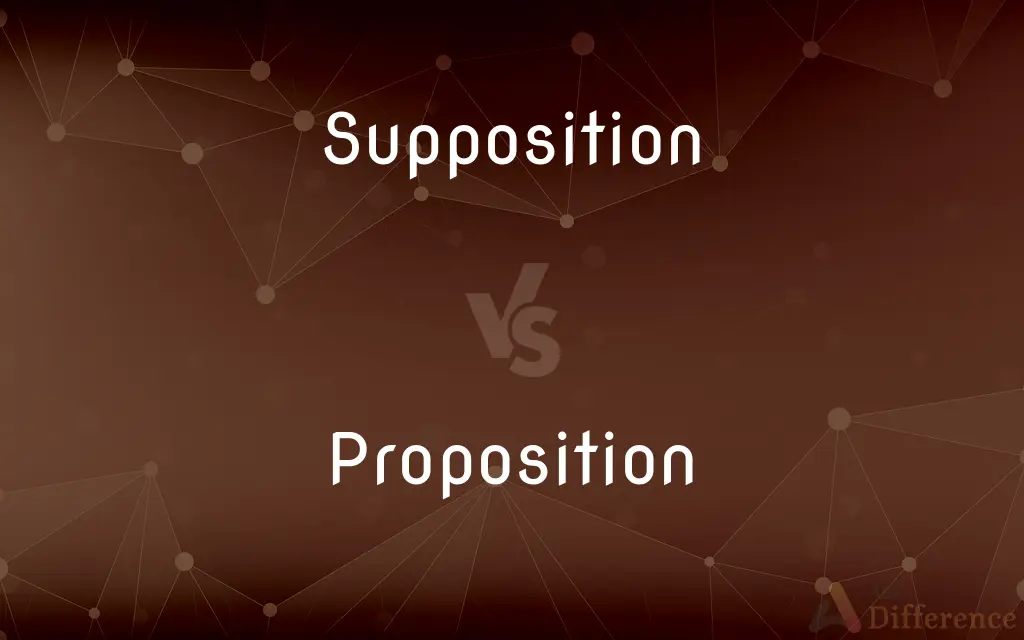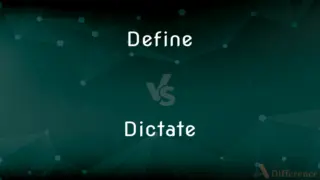Supposition vs. Proposition — What's the Difference?
By Urooj Arif & Fiza Rafique — Updated on March 7, 2024
Supposition involves assuming something is true without concrete evidence, often speculative in nature, while a proposition is a formal statement or suggestion put forward for consideration or discussion.

Difference Between Supposition and Proposition
Table of Contents
ADVERTISEMENT
Key Differences
A supposition is based on the act of supposing or conjecturing, where an individual makes an assumption or hypothesis without necessarily having proof or solid evidence to back it up. It's often used in contexts where one is speculating or theorizing about possibilities. On the other hand, a proposition is more concrete and formal, typically presented as a clear statement, idea, or plan intended for consideration, debate, or action. It is more definitive and structured compared to the speculative nature of suppositions.
In logical and philosophical contexts, suppositions are used to explore theoretical scenarios or as the basis for arguments and reasoning. They allow for the exploration of ideas without the immediate need for empirical validation. Propositions, in contrast, are often used to present premises in logical arguments, statements in mathematical proofs, or specific offers and suggestions in business and everyday communication. They carry a weight of intention and clarity that suppositions might not.
Suppositions can be fluid and subject to change as they are further explored or as more information becomes available. They are often the starting points for inquiry, investigation, or theoretical development. Propositions, however, once put forward, serve as defined points for consideration, requiring a response or action, such as acceptance, rejection, or further discussion.
The acceptance of a supposition is usually provisional, acknowledging its speculative nature, while the acceptance of a proposition often implies agreement with a more concrete statement or offer. The latter typically involves a higher level of commitment or conviction due to its clearer and more definitive nature.
In everyday language, suppositions might manifest as guesses or speculative ideas shared in casual conversation, whereas propositions are likely to appear in more formal settings, such as business proposals, academic hypotheses, or structured debates, where the clarity and directness of communication are paramount.
ADVERTISEMENT
Comparison Chart
Nature
Speculative, assumptive
Formal, definitive
Purpose
To speculate or theorize without full evidence
To present a clear statement or suggestion
Context
Theoretical, exploratory
Logical arguments, business, academia
Fluidity
Subject to change, provisional
Relatively fixed, requiring a response or action
Acceptance
Provisional, acknowledging speculation
Implies agreement or the need for consideration
Communication
Often informal, exploratory
Formal, direct, and structured
Compare with Definitions
Supposition
They are often the starting points for theoretical development.
Philosophers frequently base discussions on suppositions about human nature.
Proposition
Propositions in business refer to specific offers or plans.
The startup presented a compelling proposition to the investors.
Supposition
A supposition is an assumption made without concrete evidence.
His supposition that the treasure was buried in the garden led to a fruitless search.
Proposition
A proposition is a formal statement or suggestion for consideration.
The committee reviewed the proposition for a new policy on sustainability.
Supposition
In conversation, suppositions are speculative ideas or guesses.
Her supposition that the meeting would be canceled was incorrect.
Proposition
In logic and mathematics, propositions are statements with a defined truth value.
The proposition All squares have four sides is universally true.
Supposition
Suppositions are subject to revision as more information becomes available.
The detective's initial supposition about the suspect changed with new evidence.
Proposition
Propositions are used in academic and formal contexts to advance arguments or theories.
His proposition that time is a circular continuum challenged conventional theories.
Supposition
Suppositions serve as tentative ideas for exploration or argument.
The scientist's supposition about the particle's behavior sparked a new line of research.
Proposition
They require a response, such as acceptance or rejection.
The proposition for the merger was met with unanimous approval.
Supposition
The act of supposing.
Proposition
In logic and linguistics, a proposition is the meaning of a declarative sentence. In philosophy, "meaning" is understood to be a non-linguistic entity which is shared by all sentences with the same meaning.
Supposition
Something supposed; an assumption.
Proposition
A plan suggested for acceptance; a proposal.
Supposition
Something that is supposed; an assumption made to account for known facts, conjecture.
Proposition
A matter to be dealt with; a task
Finding affordable housing can be a difficult proposition.
Supposition
The act or an instance of supposing.
Proposition
A subject for discussion or analysis.
Supposition
The act of supposing, laying down, imagining, or considering as true or existing, what is known not to be true, or what is not proved.
Proposition
A statement that affirms or denies something.
Supposition
That which is supposed; hypothesis; conjecture; surmise; opinion or belief without sufficient evidence.
This is only an infallibility upon supposition that if a thing be true, it is imposible to be false.
He means are in supposition.
Proposition
The meaning expressed in such a statement, as opposed to the way it is expressed.
Supposition
A message expressing an opinion based on incomplete evidence
Proposition
(Mathematics) A theorem.
Supposition
A hypothesis that is taken for granted;
Any society is built upon certain assumptions
Proposition
(uncountable) The act of offering (an idea) for consideration.
Supposition
The cognitive process of supposing
Proposition
(countable) An idea or a plan offered.
Proposition
The terms of a transaction offered.
Proposition
In some states, a proposed statute or constitutional amendment to be voted on by the electorate.
Proposition
(grammar) A complete sentence.
Proposition
The content of an assertion that may be taken as being true or false and is considered abstractly without reference to the linguistic sentence that constitutes the assertion; (Aristotelian logic) a predicate of a subject that is denied or affirmed and connected by a copula.
“‘Wiktionary is a good dictionary’ is a proposition” is a proposition.
Proposition
An assertion so formulated that it can be considered true or false.
Proposition
An assertion which is provably true, but not important enough to be called a theorem.
Proposition
A statement of religious doctrine; an article of faith; creed.
The propositions of Wyclif and Huss
Proposition
(poetic) The part of a poem in which the author states the subject or matter of it.
Proposition
Misspelling of preposition
Proposition
To make an offer or suggestion to (someone).
Proposition
The act of setting or placing before; the act of offering.
Proposition
That which is proposed; that which is offered, as for consideration, acceptance, or adoption; a proposal; as, the enemy made propositions of peace; his proposition was not accepted.
Proposition
A statement of religious doctrine; an article of faith; creed; as, the propositions of Wyclif and Huss.
Some persons . . . change their propositions according as their temporal necessities or advantages do turn.
Proposition
A complete sentence, or part of a sentence consisting of a subject and predicate united by a copula; a thought expressed or propounded in language; a from of speech in which a predicate is affirmed or denied of a subject; as, snow is white.
Proposition
A statement in terms of a truth to be demonstrated, or of an operation to be performed.
Proposition
That which is offered or affirmed as the subject of the discourse; anything stated or affirmed for discussion or illustration.
Proposition
The part of a poem in which the author states the subject or matter of it.
Proposition
(logic) a statement that affirms or denies something and is either true or false
Proposition
A proposal offered for acceptance or rejection;
It was a suggestion we couldn't refuse
Proposition
The act of making a proposal;
They listened to her proposal
Proposition
A task to be dealt with;
Securing adequate funding is a time-consuming proposition
Common Curiosities
Is every hypothesis a supposition?
While every hypothesis can be considered a supposition, not every supposition reaches the level of formality or testing associated with a scientific hypothesis.
Can a proposition be false?
Yes, a proposition can be false; it is a statement that is either true or false, and its truth value is determined by the accuracy of the information it presents.
What makes a proposition valid in logic?
In logic, a proposition's validity depends on its form and the truth of its premises, not on the actual truth value of the statement itself.
How is a supposition used in scientific research?
In scientific research, a supposition is often used as a preliminary hypothesis that guides initial exploration or experimentation, subject to validation or refutation by empirical evidence.
Can a supposition become a proposition?
A supposition can evolve into a proposition if it is formalized and presented as a clear statement or suggestion for consideration or action.
What role do suppositions play in philosophical arguments?
In philosophical arguments, suppositions are used to explore theoretical scenarios, ethical dilemmas, or metaphysical questions, often serving as foundational assumptions for further reasoning.
How do cultural differences affect the interpretation of propositions?
Cultural differences can affect the interpretation of propositions by influencing the context, language nuances, and underlying assumptions that shape the meaning and reception of formal statements.
What is a supposition in literature?
In literature, a supposition is an assumption or hypothesis made by a character, narrator, or author that influences the narrative without being explicitly proven within the story.
How do propositions impact business decisions?
Propositions impact business decisions by presenting specific ideas, plans, or offers that decision-makers must consider, accept, reject, or negotiate.
What is the importance of clarity in propositions?
Clarity in propositions is crucial to ensure they are understood as intended, facilitating effective communication, decision-making, and debate in various contexts.
Share Your Discovery

Previous Comparison
Define vs. Dictate
Next Comparison
Fan vs. FenAuthor Spotlight
Written by
Urooj ArifUrooj is a skilled content writer at Ask Difference, known for her exceptional ability to simplify complex topics into engaging and informative content. With a passion for research and a flair for clear, concise writing, she consistently delivers articles that resonate with our diverse audience.
Co-written by
Fiza RafiqueFiza Rafique is a skilled content writer at AskDifference.com, where she meticulously refines and enhances written pieces. Drawing from her vast editorial expertise, Fiza ensures clarity, accuracy, and precision in every article. Passionate about language, she continually seeks to elevate the quality of content for readers worldwide.














































